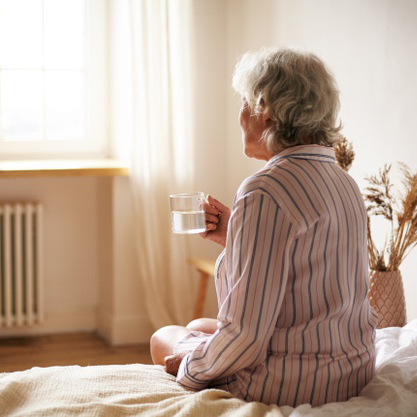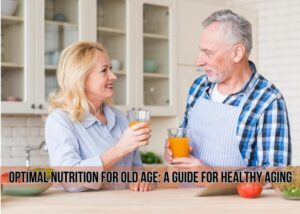Geriatric Nutrition
What is Geriatric Nutrition
Old age is one of the vulnerable and prone stages in terms of health status. It requires a lot of awareness, motivation, and support, physically, mentally, and socially. Geriatric nutrition is essential, determining the factor of elderly mass, specifically over the age of 60 years. Geriatric diet has been always underreported, though everyone wants to make the senescence easy. Adequate nutrition is always important for better aging because malnutrition leads to decreased independence due to physical weakness and muscle wasting. As people age, geriatric nutrition propels the maintenance of health, physical performance, and psychological well-being. Immunity weakens with proceeding age, which is influenced by lack of nutrients and differed dietary habits.
Need Consultation for a geriatric diet?
Quickly Book an Appointment.

Physiological changes during aging
- Body composition changes as fat replaces muscle, in a process called sacropenia.
- Basal metabolic rate (BMR) declines about 5% per decade during adulthood.
- Body water decreases with the drop in caloric needs and lowered protein reserves.
- with progressive age digestive hormones decreases and so the enzymes
- A progressive drop in bone mass starts when people are in their 30s and 40s
- Memory impairment caused by various types of dementia, Alzheimer’s disease, or other neurological diseases rises markedly.
- Overweight and obese individuals are at an enhanced risk of co-morbidities including type 2 diabetes, fatty liver disease, gallstones, high blood cholesterol and triglycerides, orthopaedic disorders (Osteoarthritis), hypertension and other cardiovascular diseases, certain cancers and psycho-social problems.
Nutritional requirement in aging
Nutritional requirements in aging, as assessed by a geriatric dietitian, play a crucial role in the health and well-being of geriatric patients. Caloric needs may decrease with age, but it’s important to note that these requirements can vary greatly among individuals.
The role of antioxidants such as vitamin E, carotenoids, and vitamin C becomes increasingly significant in the diets of geriatric patients, as they have the potential to enhance immune function, a key concern in aging individuals.
While the need for vitamin A tends to decrease, diet for geriatric patients often require higher levels of nutrients like riboflavin, vitamin B6, vitamin B12, and zinc to support overall health.
Additionally, encouraging regular physical activity, including activities like walking and yoga, is essential for maintaining body movements and overall vitality in the elderly. The expertise of a dedicated geriatric dietitian can help tailor a diet plan that meets these specific nutritional needs for geriatric patients.
Behaviour Guidelines
Elderly should incorporate small frequent meals at regular intervals. Gap between two meals should not be less than 3 hours. Emphasis should be on not skipping breakfast and having early dinner choose healthy snack options. Follow the healthy dietary guidelines while eating out. Boiled / steamed / roasted / grilled cooking methods should be preferred over frying Alcohol is not under recommendation.
Dietary Guidelines
Variety of nutrition for geriatric patients include whole grains, millets, and pulses should be included in the daily diet.
- Two Glasses (1 glass = 250 ml) of low-fat milk and equivalent milk products should be included in the food for geriatric patients’ diet.
- About 4 – 5 servings of fruits and vegetables (all colors) should be included. Encourage intake of salads.
- 15 – 20 g of healthy oil (low Saturated Fatty Acids and Trans Fatty Acids) is recommended. Promote alternate oils. Substitute nuts and oilseeds in place of fats and oils.
• For non-vegetarians, egg white, lean chicken, and fish is recommended.

Food & Wellness Geriatric Nutrition Programme
Food‘n’Wellness helps you to Emphasize on healthy traditional diet, consumption of available protective foods; Minimize or combine foods containing hidden animal fats (fatty meat, full-fat dairy products, some fast/processed food, and hydrogenated plant fats (some fast/processed food, commercial cakes/biscuits); Limit visible oil consumption; Enjoy food and eating in the company of others, but avoid the regular use of energy dense (poor nutrient content) celebratory foods and beverages which are high in fat and or sugar.
Let's get started with treating your condition...
At Food & Wellness we believe that every individual is different and needs special attention. We adapt our programme to your existing lifestyle and try not to change anything drastically so you can easily transition. Over a period of time we ensure results and help you restore your health.
Geriatric Nutrition Articles

Nutrition Needs When You’re Over 65
Aging is a natural process, and our nutritional requirements also change as we age. The food and drinks one consumed at a younger age may not be ideal now. In other words, there will be a change in the nutritional intake as you age. Ensuring a healthy diet becomes paramount for both men and women

Optimal Nutrition for Old Age: A Guide for Healthy Aging
“The food you eat can be either the safest and most powerful form of medicine or the slowest form of poison.” – Ann Wigmore (Holistic Health Practitioner) As rightly pointed out, what we eat becomes super important for our health and well-being. So, we really need to focus on eating healthy stuff to stay in

Sleep Problems among the Elderly: Tips to Overcome it
Aging is one of the most natural things to happen to us. No matter how healthy or fit we are, we all will age. And as we grow older, we often find it difficult to do things that we have almost always taken for granted. Not being able to sleep properly is one such problem that is widely seen among the elderly. Among all other sleep disorders, the most common is insomnia, that has several medical and psychiatric repercussions.


